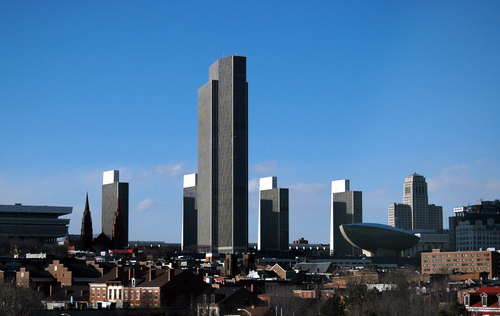When homes wait longer than 60 days looking for a buyer, that doesn't necessarily mean there is not a lot going on, economically, in those markets. Slower home sales could mean houses were priced too high or owners lacked the equity to negotiate pricing or terms.
But the bottom line is that homes took a long time to sell in some areas. The following real estate markets represent areas where the average home, put on the market on July 1, did not find a buyer for several months, according to research conducted by the online realty firm Trulia.
All of the markets listed have plenty of economic activity; one is the capital of one of the most economically dynamic states in the U.S.
But when it comes to real estate, whatever these areas had going for them economically did not make local homes sell quickly.
Read more: Economic prosperity doesn't guarantee home sales …
 1. Richmond, Va.
1. Richmond, Va.
After the Civil War, Richmond paid a high price for its role as the capital of the Confederate States of America. Today, Virigina's state capital now reigns over one of the strongest economies in the U.S., according to the U.S. Census and Federal Reserve.
The two agencies' data said Virginia has the seventh strongest state economy in the country and has the largest concentration of technology workers on a per capita basis. Suburban markets outside Washington and Norfolk also helped support Richmond's economy, the agencies said.
But home sellers in Richmond have not reaped the reward of Virginia's strong economy. Trulia reported as of April that 72% of Richmond homes languish on the market for at least 60 days. And while real estate prices have not fallen, Richmond homes gained only 3.6% over the last year.
Read more: Insuring the sale …
 2. Hartford, Conn.
2. Hartford, Conn.
Hartford is known as the capital of the U.S. insurance industry, but also has a strong high tech manufacturing base, said City-Data.com, a website that tracks economic and population data from government sources.
The greater Hartford metropolitan area is home to seven major insurance firms: Aetna Inc., Travelers Property Casualty Corp., MassMutual, The Hartford Financial Services Group, CIGNA, The Phoenix Companies, and The United Health Care Company, according to City-Data.
But while Hartford also serves as Connecticut's capital, 71% of its homes remained on the market more than 60 days after being listed, according to Trulia. In addition, Hartford real estate prices dropped 1.2% over the past year, the online real estate firm reported.
Read more: Market as cold as the weather …
 3. Albany, N.Y.
3. Albany, N.Y.
New York's state capital is in Albany, and 25% of the city's workforce engages in state legislative or administrative work, according to City-Data.com. This gave Albany a relatively stable, but also slow moving economy, the website observed.
To spark innovation, Albany pursued high tech firms and workers. Today, Albany angling to surpass Austin, Texas, as a national high-tech startup hub.
But despite the high tech influx, the wealth has not been enough to spark Albany's real estate market, according to Trulia. Fully 70% of Albany's homes remain on the market more than 60 days before being sold, and prices have dropped 1.5% during the past year.
Read more: An A for education but an F for home sales …
 4. New Haven, Conn.
4. New Haven, Conn.
New Haven's economy is transitioning from manufacturing to service and high tech, but has not made it yet, according to City-Data. The greater metropolitan area has several well-established bio-tech firms with more likely to come and these companies alone added some 1,000 jobs to the regional economy in the late 1990s, and continued to fuel the economy into the 2000s.
In addition, the city boasts a significant higher education influence, led by Yale University. Yale and other local colleges collectively maintain a student base of nearly 50,000 and employ thousands of others, City-Data.com reported.
But even with focus on high tech and educational growth, Trulia reported 70% of houses put on the market in New Haven remain there more than 60 days later. And, New Haven's real estate prices slumped 0.3% in the last year.
Read more: Suburbia officially uncool …
 5. Long Island, N.Y.
5. Long Island, N.Y.
The health of the real estate market and economy in Long Island depends on location. Much of NYC's island suburb has an aging population, high tax rates, a shrinking manufacturing base and car-oriented neighborhoods, according to City-Data and other sources. These neighborhoods, full of single-family homes, are increasingly unattractive to young people.
But the island is also home to Suffolk and Nassau counties, which have seen very strong job growth the last two years, according to the Wall Street Journal, albeit with generally lower paying jobs.
Still, the growth in Suffolk and Nassau has not been enough to make Long Island homes move much, according to Trulia. Seventy percent remain on the market more than 60 days. On the bright side, home prices rose 4.8% in the last year.
© 2025 ALM Global, LLC, All Rights Reserved. Request academic re-use from www.copyright.com. All other uses, submit a request to [email protected]. For more information visit Asset & Logo Licensing.







